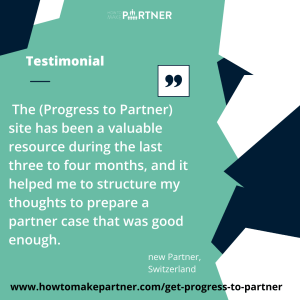I regularly speak to audiences of lawyers, accountants and consultants about the challenges of making partner. In my talks I often share the ten lessons that my clients have learnt along their journeys to make partner. In this blog post I am going to share the tenth and final lesson; starting working towards your partner business case earlier rather than later
What is your partner Business Case?
Your Business Case is where you demonstrate to your partners the commercial benefits to them of admitting you to the partnership. This isn’t something you can write in a weekend. Creating a business case normally has three phrases:
- Building your business case – i.e. building the start of your own practice
- Writing your business case – i.e. filling in your practice’s business case forms and documents
- Pitching your business case in the partnership panel interview
If you need help with any part of the Business Case process, then download my free guide to creating a cast-iron business case for partner The guide draws heavily from Chapter 11 of my book, Poised for Partnership*.
Why start working towards your partner Business Case earlier rather than later?
Aside from the obvious reason that a large client portfolio doesn’t get built overnight, there are some very good reasons for starting your Partner Business Case right now.
I’ve lost count of the number of times I have been contacted by a flustered senior associate or director who has been asked to submit their Business Case for partnership by Monday – often with little or no warning that this will happen.
This happens in both the small firms and the large firms. In fact, it’s fairly common in a Big 4 firm for the partners to ask their partner candidates to submit a draft Partnership Business Case so the partners can discuss it before it is formally submitted.
If you’ve already got some of your Partner Business Case written down, it is much easier to produce your case with little or no warning. When you articulate your Business Case on paper, it crystallises your focus going forward.
After all, most Business Cases will contain a 12-month marketing plan, your numbers – i.e. what your practice is worth now and will be in the future, and most importantly, why your partners should choose you as a new partner.
When you’ve written this down, you can see where you have gaps and give yourself time to close these gaps before you actually need to formally submit your business case.
 One of our most sought-after courses in our Progress to Partner Academy is called “How to Build a Cast-Iron Business Case for Partner”. We think it’s a must-have in your arsenal of tools and guidance to help with your career progression. There is also a section on the Partnership Admissions process with guides and recordings to help you find your way through the system. Find out more here
One of our most sought-after courses in our Progress to Partner Academy is called “How to Build a Cast-Iron Business Case for Partner”. We think it’s a must-have in your arsenal of tools and guidance to help with your career progression. There is also a section on the Partnership Admissions process with guides and recordings to help you find your way through the system. Find out more here
In summary:
You never know when you may be asked to submit your Business Case. The earlier you work on it, the less of a last-minute scramble to submit it. But more importantly, the earlier you work on your Business Case the stronger it will become.
Start working on your own career progression. Why not sign up to receive my weekly tips here and you’ll find out what you need to be working on in your career development (and how to make the time for your career development) to progress your career in your firm.
What’s in Progress To Partner which will help you with your the final step up to partner?
Progress to Partner Academy that will give your the knowledge AND confidence to fly through this final step up to partner.
that will give your the knowledge AND confidence to fly through this final step up to partner.
It’s like a Netflix for your career in the professions. Find what you need to watch or read at the time you need it. Within the site, you’ll find over 150+ courses, videos, checklists, templates and plans to help you progress your career to partner. Amongst the many curated resources (no more unnecessary scrolling or searching), you’ll find:
- On-demand courses on how to create and articulate your business case, including our most downloaded course “How to Build a Cast-Iron Business Case for Partner”
- A section on the Partnership Admissions process with guides and recordings to help you find your way through the process with your sanity intact.
- Recordings and checklists on how to ace your partner panel interview
- On-demand courses on how to win the right sort of clients
- Proven advice on how to still do the day job and find the time to get through the Partner Track process








